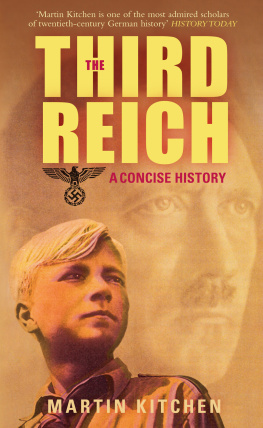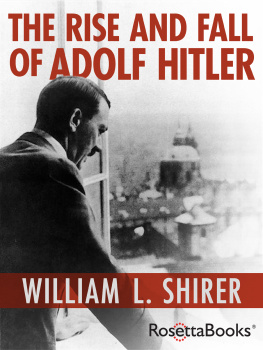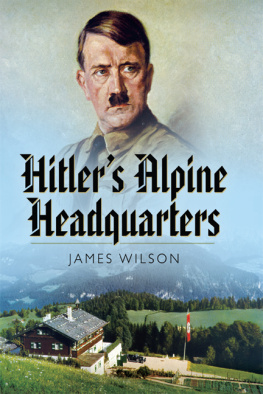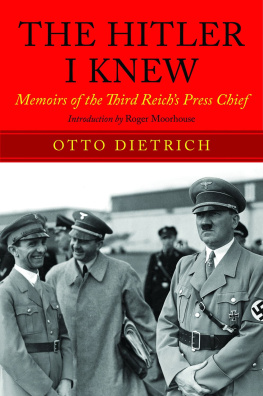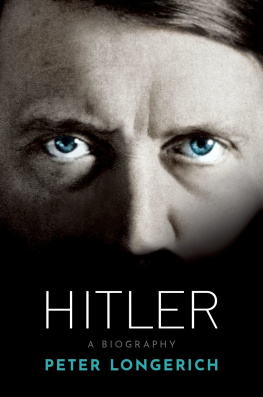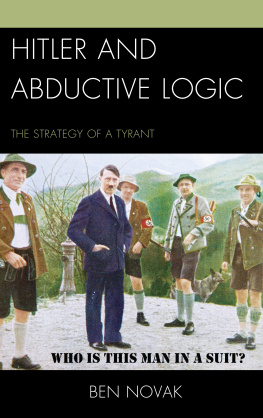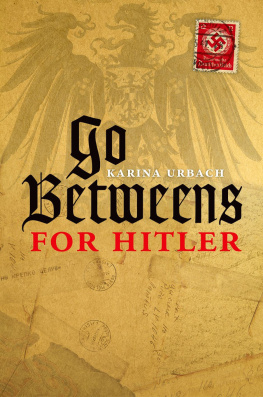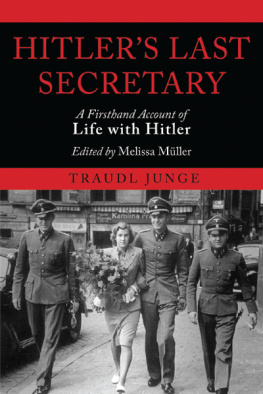Hitler
Adolf Hitler is the most notorious political figure of the twentieth century. The story of his life, how he became a dictator, and how he managed to convince so many to follow his cause is a subject of perennial fascination.
Balancing narrative and analysis, this biography employs a chronological approach to describe the main features of Hitlers career. Set against the background of developments in Germany and Europe during his lifetime, the text tells the extraordinary story of how an Austrian layabout rose to become Fhrer of the Third Reich.
The chapters incorporate into their narrative the major debates surrounding Hitlers ideas, behaviour and historical significance. Particular attention is paid to his experience as a soldier in 191418 and to the reasons why his original left-wing sympathies transmuted into Nazism. Arguments over the real character of Hitlers dictatorship are analysed and a measured assessment is offered of the disputed issues of how far Hitler initiated the Third Reichs domestic and foreign policies himself and to what extent he was controlled by events. His destructive leadership of wartime Germany is now a subject of close scrutiny among historians and the books final chapters deal with this theme and offer a set of reflections on Hitlers relationship with the German people and his legacy to the German nation.
Michael Lynch provides a balanced guide to this most difficult of figures that will be enlightening for students and general readers alike.
Michael Lynch is an Honorary Fellow in the School of Historical Studies at the University of Leicester. His research interests are in modern European and Chinese history and his recent student-friendly publications include: Mao (2004), Modern China (2006), Autocracy to Communism: Russia 18941941 (2008), and Nazi Germany (2012).
ROUTLEDGE HISTORICAL BIOGRAPHIES
Series Editor: Robert Pearce
Routledge Historical Biographies provide engaging, readable and academically credible biographies written from an explicitly historical perspective. These concise and accessible accounts will bring important historical figures to life for students and general readers alike.
In the same series:
Bismarck by Edgar Feuchtwanger
Calvin by Michael A. Mullett
Neville Chamberlain by Nick Smart
Oliver Cromwell by Martyn Bennett
Edward IV by Hannes Kleineke
Elizabeth I by Judith M. Richards
Gladstone by Michael Partridge
Henry VII by Sean Cunningham
Henry VIII by Lucy Wooding
Lenin by Christopher Read
Louis XIV by Richard Wilkinson
Mao by Michael Lynch
Martin Luther King Jr. by Peter J. Ling
Martin Luther by Michael A. Mullet
Marx by Vincent Barnett
Mary Queen of Scots by Retha M. Warnicke
Mussolini by Peter Neville
Nehru by Ben Zachariah
Emmeline Pankhurst by Paula Bartley
Richard III by David Hipshon
Trotsky by Ian Thatcher
Mary Tudor by Judith M. Richards
Forthcoming:
Churchill by Robert Pearce
Franco by Antonio Cazorla-Sanchez
John Maynard Keynes by Vincent Barnett
First published 2013
by Routledge
2 Park Square, Milton Park, Abingdon, Oxon OX14 4RN
Simultaneously published in the USA and Canada
by Routledge
711 Third Avenue, New York, NY 10017
Routledge is an imprint of the Taylor & Francis Group, an informa business
2013 Michael Lynch
The right of Michael Lynch to be identified as author of this work has been asserted by him in accordance with sections 77 and 78 of the Copyright, Designs and Patents Act 1988.
All rights reserved. No part of this book may be reprinted or reproduced or utilised in any form or by any electronic, mechanical, or other means, now known or hereafter invented, including photocopying and recording, or in any information storage or retrieval system, without permission in writing from the publishers.
Trademark notice: Product or corporate names may be trademarks or registered trademarks, and are used only for identification and explanation without intent to infringe.
British Library Cataloguing in Publication Data
A catalogue record for this book is available from the British Library
Library of Congress Cataloging-in-Publication Data
Lynch, Michael J., 1938
Hitler / Michael Lynch.
p. cm. (Routledge historical biographies)
Includes bibliographical references and index.
1. Hitler, Adolf, 18891945. 2. Heads of stateGermanyBiography. 3. GermanyPolitics and government19331945. 4. National socialism. 5. Holocaust, Jewish (19391945) I. Title.
DD247.H5L96 2012
943.086092dc23
[B]
2012012060
ISBN: 978-0-415-43647-2 (hbk)
ISBN: 978-0-415-43646-5 (pbk)
ISBN: 978-0-203-09493-8 (ebk)
Typeset in Garamond
by Taylor & Francis Books
In grateful remembrance of J.J. McKeown, SM (19172003)
Contents
In July 2008, a man, incensed by the sight of an effigy of Adolf Hitler on show at Madame Tussauds waxworks in London, severed its head with a knife. In May 2011, a Danish director was debarred from the Cannes Film Festival for saying that he understood Hitler and sympathised with him a little bit. The Festival organisers declared the comment to be unacceptable, intolerable and contrary to the ideals of humanity. In August 2011, the BBC childrens television adventure Doctor Who described Hitler as historys most notorious war criminal. Adolf Hitlers ability from beyond the grave to excite such reaction is one sign of the execration in which he is still held seven decades after his death. The reasons for the loathing are obvious. After becoming leader of Germany in 1933, he pursued a programme that led, at home, to the suffering and death of millions of his own people and, abroad, to the most destructive war in modern history. During that war, six million Jews were deliberately killed in accordance with his policies.
A deep fascination accompanies the loathing. Interest in Hitler continues to grow. Over one thousand biographies of him have been published since his death in 1945. One of the most insistent questions with which writers of those works grapple is how was it that between 1933 and 1945 Hitler, a dull nonentity for the first thirty years of his life, could beguile one of the most cultured peoples in Europe into following him on a path of nihilism. It is unlikely that this question will ever be satisfactorily answered, though the effort to do so will doubtless continue to inspire and activate historians.


